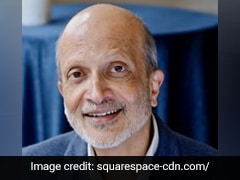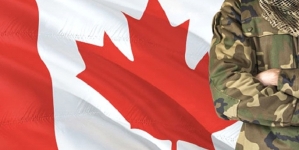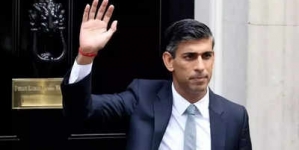-
LONDON: Indian-Origin Teen In UK Gets “Life-Changing” Cancer Treatment - April 25, 2024
-
SILICON VALLEY: All About Pavan Davuluri, New Head Of Microsoft Windows - April 25, 2024
-
LONDON: UK’s India Gate To Commemorate Role Of Indian Soldiers From World Wars - April 24, 2024
-
HARARE: Shri Bramha Kumar appointed as the next Ambassador of India to the Republic of Zimbabwe - April 23, 2024
-
LONDON: Indian-Origin Principal Wins UK Legal Challenge Over School Prayer Ban - April 23, 2024
-
TORONTO: Indian-Origin Doctor Needs ₹ 2 Crore For Legal Fees. Elon Musk Responds - April 22, 2024
-
KINSHASA: India-Democratic Republic of Congo Foreign Office Consultations - April 21, 2024
-
LONDON: UK Court Allows Sale Of Nirav Modi’s Luxury London Apartment - April 21, 2024
-
TEHRAN: Travel advisory for Iran and Israel - April 20, 2024
-
LUXEMBOURG: Shri Saurabh Kumar concurrently accredited as the next Ambassador of India to the Grand Duchy of Luxembourg - April 20, 2024
TORONTO: A Driving Force Behind India’s G20 Success
TORONTO: As part of India’s G20 presidency, which culminates in a mega summit of world leaders this weekend, Indiaspora’s G20 forum in August featured 300 trailblazers of the Indian diaspora from 26 countries.
The Indiaspora forum, looking to emerge as the “Davos for the Global Indian”, explored how the diaspora can contribute to the success of “India@100” in the year 2047. The participants included ambassadors, cabinet secretaries, investors, entrepreneurs, corporate titans, philanthropists, academics, artists, healthcare practitioners, next generation torchbearers, AI savants and environmental experts.
Indiaspora, a non-profit founded in the US in 2012, works actively in eight countries and seeks to establish strong relationships in at least 20 more. We count among us political and public policy leaders, Fortune 500 CEOs, academicians, artists, legal luminaries, doctors, scientists, investors, environmentalists and, of course, entrepreneurs. People of Indian origin are even starting to make a headway in the American sporting arena, which was so far a scarcely considered vocation for most of us.
Even casual observers have noticed that America is paying close attention to India, and is proactively seeking to bolster bilateral relations. Witness Prime Minister Narendra Modi’s recent watershed state visit, and the substantive, in-depth dialogues that took place during his stay.
India benefits from the diaspora’s close relationship to the homeland. A case in point – diaspora remittances to India topped US $100 billion in 2022. This amount is 27 percent higher than foreign direct investment. Not surprisingly, almost a quarter of these remittances came from the US alone. Cross-border financial flows are not the only item of note. According to a recent estimate, while people of Indian origin comprise slightly more than one percent of the American population, they account for 6 percent of the USA’s tax coffers. This, among other factors, enables the Indian diaspora to have a powerful voice on issues of bilateral importance in the US-India corridor.
The recent impetus for education-sector collaboration between the two countries has received a big boost from the Indian diaspora in the US. This topic was explored in a panel discussion at the Indiaspora G20 Forum. On immigration and visas, a vexed issue for millions, diaspora organisations in the US (including Indiaspora), helped effect changes in processes and rules, and are working further to advocate for helpful legislation. During the early stages of COVID, India needed raw materials to begin manufacturing vaccines. The Indian diaspora facilitated the transfer of material, technology and knowhow from the US to India, with the result that India became a sought-after and reliable global vaccine supplier. These are concrete, constructive and beneficial roles that the diaspora has played just in the recent past.
It is worth reiterating that the diaspora was key in bringing America and India together for the breakthrough civil nuclear agreement nearly two decades ago. Previous G20 presidencies were centred on specific subject areas such as empowering women, fighting corruption, strengthening financial governance, fairness of the global tax system, trade and investment, and climate action. India has chosen a more overarching theme, with defined areas of focus beneath it.
The absence of two significant leaders in the Indian capital does not diminish the aspirational value of India’s G20 slogan, “Vasudhaiva Kutumbakam” or “One Earth – One Family – One Future”, which positions it as a unifier among nations. As India ascends to become a global power, the diaspora would do well to take to heart the spirit of India’s G20 presidency.
As India’s diaspora continues to rise to positions of prominence in a variety of occupations across the globe, India benefits by harnessing their skills, networks, stature and emotional ties to their country of origin. This symbiosis augurs well for India’s progress towards 100 years of independence and beyond. The Leaders’ Summit is viewed as a culmination of India’s G20 presidency. From the diaspora dimension, it is a clarion call for a shared and brighter future, full of possibilities as a force for good.























